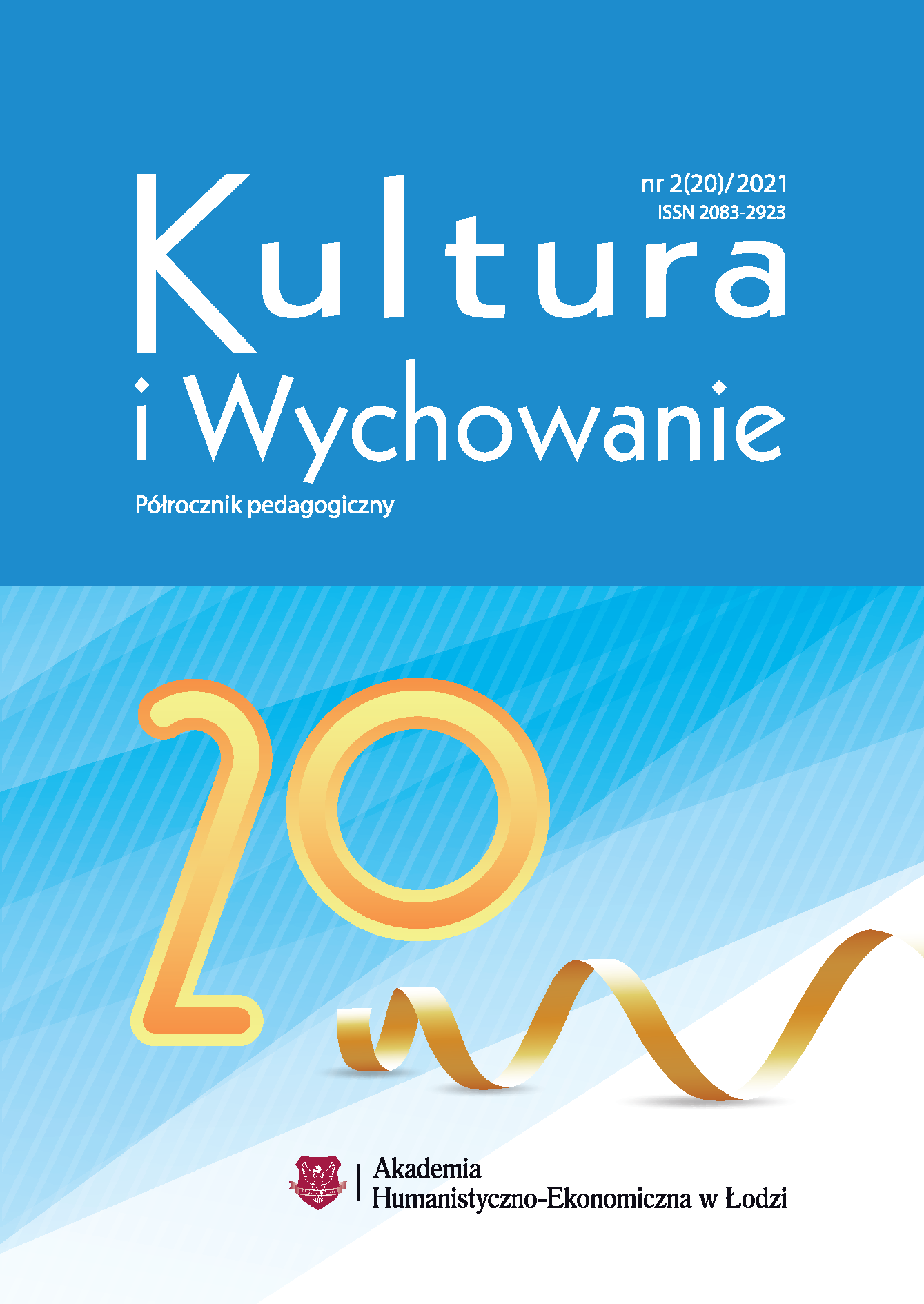Online speech therapy from the perspective of speech therapists
DOI:
https://doi.org/10.25312/2083-2923.20/2021_04akKeywords:
online speech therapy, remote therapy, speech therapist, neurologist, remote educationAbstract
Speech therapy is a process that requires the involvement of the therapist, the patient and (in the case of children’s therapy), parents. Classes include diagnosis during which pronunciation is assessed as well as the functioning of the speech organs and their anatomical structure. During therapy the speech therapist often needs direct contact with the patient in order to call up the sound (manually or with a spatula or speech therapy vibrator), massage the face or articulation organs, and show (by touch) where the tongue should be while uttering the sound. Online speech therapy is therefore a new and difficult challenge for speech therapists as until now working directly with the patient has been their main activity. This article presents the results of a study by 205 speech therapists who answered questions about online speech therapy and compared it with inpatient therapy.
Downloads
References
Bulewicz K., Miejsce logopedy w systemie oświaty w Polsce – ujęcie liczbowe, „Biuletyn Logopedyczny” 2010, nr 1.
Chlanda A., Funkcjonowanie społeczno-emocjonalne dzieci z samoistnym opóźnionym rozwojem mowy w wieku poniemowlęcym, „Forum Logopedy” 2020, nr 39.
Fong R., Fung Tsai C., Yan Yiu O., The Implementation of Telepractice in Speech Langumage Pathology in Hong Kong During the COVID-19 Pandemic, „Telemedicine and e-Health”, 2011, No. 21(1).
Gacka E., Diagnoza logopedyczna noworodka, „Interdyscyplinarne Konteksty Pedagogiki Specjalnej” 2016, nr 14.
Gacka E., Kaźmierczak M., Sujecka-Brzóska A., Propozycja modelu współpracy logopedy i ortodonty, „Logopedia” 2020, nr 49(1).
Gacka E., Podejście interakcyjne rodzic–dziecko w terapii opóźnień rozwoju mowy, „Logopedia” 2019, nr 48(1).
Gruba J., Wykorzystanie technologii informacyjnej w logopedii, „Logopeda” 2009, nr 1(7).
Gruszczuk-Kolczyńska E., Zgubne skutki zezwalania dzieciom na oglądanie ponad miarę telewizji, korzystania z komputerów i tabletów, „Człowiek – Niepełnosprawność – Społeczeństwo” 2013, nr 2(20).
Jatkowska J., Nowe technologie w terapii logopedycznej dzieci z zaburzeniami mowy, „Logopaedica Lodziensia” 2020, nr 4.
Kaptur E., Logoped(i)a online, czyli o internetowym rynku usług logopedycznych, [w:] A. Momot (red.), Media XXI wieku – studia interdyscyplinarne, Stowarzyszenie Młodych Twórców „Kontrast”, Wrocław 2016.
Karowicz A., Przeszkody i wyzwania w pracy zawodowej logopedy podczas pandemii COVID-19, „Logopaedica Lodziensia” 2021, nr 5.
Lechta V., Podstawy teoretyczne logopedii, [w:] G. Gunia, V. Lechta (red.), Wprowadzenie do logopedii, Oficyna Wydawnicza „Impuls”, Kraków 2011.
Pluta-Wojciechowska D., Czy logopeda wywołuje głoski, „Logopedia” 2012, nr 41.
Pluta-Wojciechowska D., Paradygmat postępowania w przypadku zaburzeń połykania w fazie ustnej. Ujęcie logopedyczno-ortodontyczne, „Forum Logopedyczne” 2011, nr 19.
Pluta-Wojciechowska D., Płonka A., Diagnoza i terapia zaburzeń realizacji fonemów, Wydawnictwo Uniwersytetu Śląskiego, Katowice 2015.
Siedliska A., Zdalna terapia logopedyczna osób dorosłych z zaburzeniami neurologicznymi, [w:] E. Domagała-Zyśk (red.), Zdalne uczenie się i nauczanie a specjalne potrzeby edukacyjne, Wydawnictwo Episteme, Lublin 2020.
Syta A., Wpływ ankyloglosji na funkcje prymarne, „Logopedia Silesiana” 2019, nr 8.
Szustowska M., Zdalne nauczanie uczniów z niepełnosprawnością, „Szkice i Rozprawy: Student niepełnosprawny” 2020, nr 20(13).
Szymańska J., Logopedia na odległość, „Refleksje” 2019, nr 4.
Vecerkova E., Logopedické terapie online, Pedagogická fakulta Univerzity Bakalářská prace, Hradec Králové 2020.
Winczura B., Wczesne rozpoznawanie autyzmu u małych dzieci – sygnały ostrzegawcze dla diagnozy zaburzeń ze spektrum autyzmu, „Psychiatria i Psychologia Kliniczna” 2019, nr 19(2).
Źródła internetowe:
Polski Związek Logopedów, https://logopeda.org.pl/new.php?id=1212 [dostęp: 1.07.2021].
Downloads
Published
Issue
Section
License
Copyright (c) 2022 Akademia Humanistyczno-Ekonomiczna w Łodzi

This work is licensed under a Creative Commons Attribution-ShareAlike 4.0 International License.

